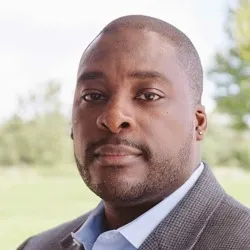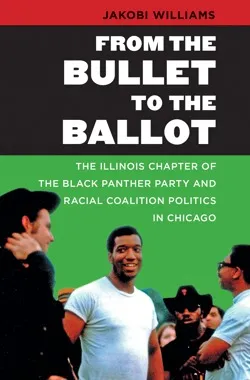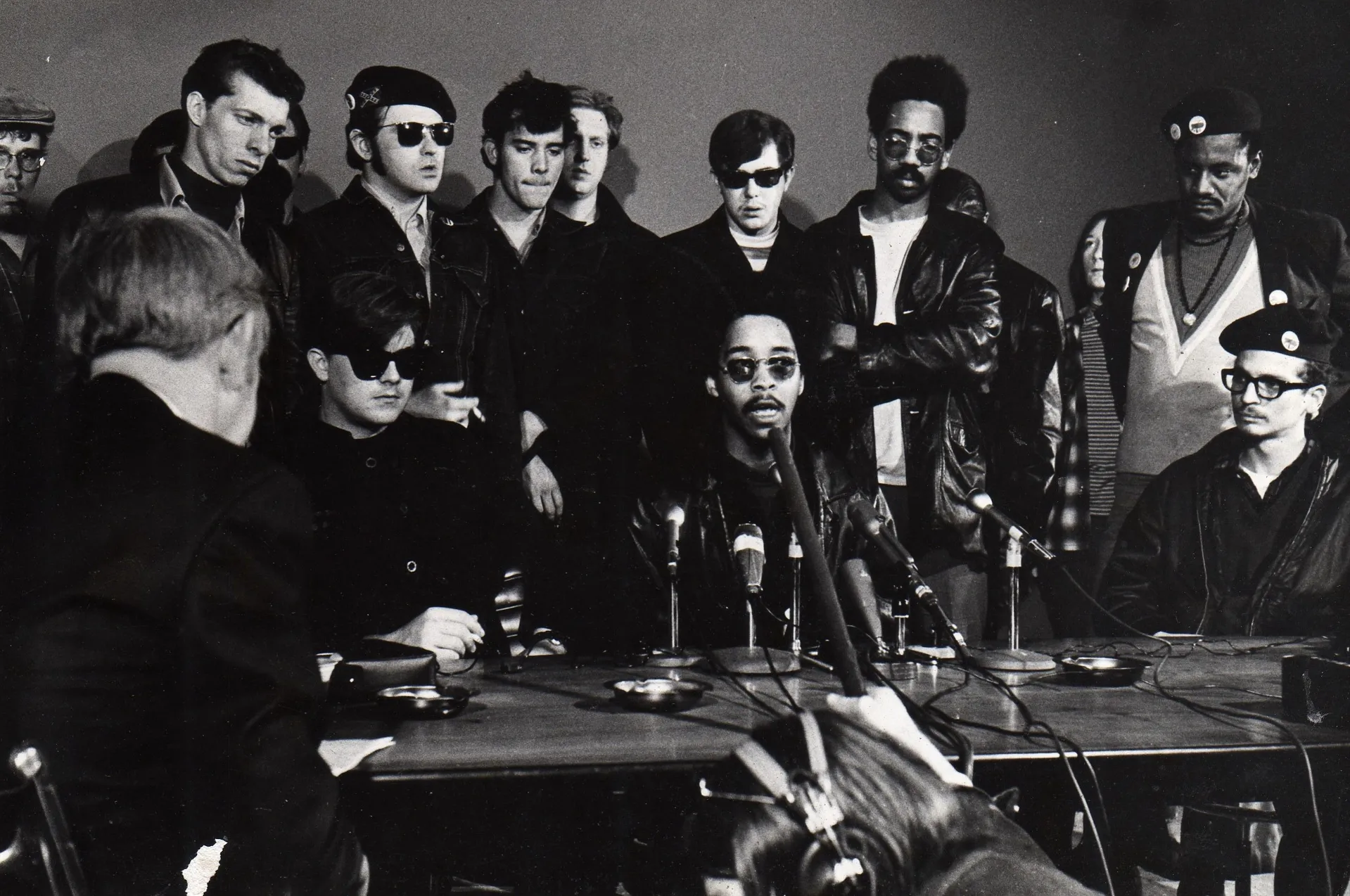By Jakobi Williams
Several political and media pundits have drawn parallels between activists of the Black Power movement of the 1960s and the Black Lives Matter (BLM) movement of today. However, few have included the Rev. Dr. Martin Luther King, Jr.’s influence upon and connection to both periods of struggle as the foundation of the bond that links the two movements. These connections are both obvious and obscure, and appear in examples that not only align with King’s ideology but also in examples that seem to be at odds with it. Dr. King was an agitator and a radical who demonstrated how to be disruptive in the struggle for racial and social justice. Separate this factor from King romanticism and we find his influence in numerous campaigns.
In his 1963 Letter from Birmingham Jail, Dr. King wrote, “An individual who breaks a law that conscience tells him is unjust, and willingly accepts the penalty by staying in jail to arouse the conscience of the community over its injustice, is in reality expressing the very highest respect for the law.” It is in this respect that the most popular Black Power group, the Black Panther Party (BPP), and Black Lives Matter activists are intricately linked to Dr. King’s legacy. King’s social movement awakened a succession of social protests that produced a new generation of leader, even transforming street gangs into youthful political organizations.
For instance, the notorious Chicago south side street gang, Blackstone Rangers, joined King’s nonviolent Chicago Freedom Movement campaign in 1966. During a King led march through Chicago’s white racist southwest side community of Gage Park, the street youth brought baseball gloves that they used to catch bricks thrown at Dr. King by white mobs, and protected King and marchers as they returned to demonstration's staging area.. The Illinois chapter of the Black Panther Party grew out of the Chicago Freedom movement as some of the chapter’s leaders and members participated in the King led demonstrations and workshops in Chicago.
 In 1969, the Panthers held a press conference in Chicago to commemorate the one-year anniversay of King's assassination and to announce the creation of the original Rainbow Coalition, which was made up of the BPP, the Young Patriots (Confederate flag wearing southern whites), the Young Lords (Puerto-Rican youth), and Rising Up Angry, (white student leftists). The Rainbow Coalition advocated solidarity among poor and oppressed people who were determined to eradicate capitalism and its divisive forces that pitted such folks against one another. Panthers such as Fred Hampton eclipsed one of King’s accomplishments by forging coalitions with a segment of society (Confederate flag wearing southern whites) that was antithetical to the civil rights movement.
In 1969, the Panthers held a press conference in Chicago to commemorate the one-year anniversay of King's assassination and to announce the creation of the original Rainbow Coalition, which was made up of the BPP, the Young Patriots (Confederate flag wearing southern whites), the Young Lords (Puerto-Rican youth), and Rising Up Angry, (white student leftists). The Rainbow Coalition advocated solidarity among poor and oppressed people who were determined to eradicate capitalism and its divisive forces that pitted such folks against one another. Panthers such as Fred Hampton eclipsed one of King’s accomplishments by forging coalitions with a segment of society (Confederate flag wearing southern whites) that was antithetical to the civil rights movement.
The Black Panther Party's grassroots organizing reflected the core components of King's legacy and philosophical al approach to change. The Panther’s survival program’s (community service programs that the party hoped would ensure Black people's survival pending revolution) were designed to eliminate the profit motive from the daily human necessities that people need to survive. All of their programs provided free services and the Panthers advanced their program’s self-determination resources as pragmatic and realistic. Essentially, the Panther’s programs and the original Rainbow Coalition—a merger of poor people that included poor southern whites, various Latino groups, Native Americans, Asian American, as well as labor and student groups—were the epitome of King’s Poor People Campaign.
The political and economic problems that impacted poor black and oppressed communities during King’s life are just as pesent today. The levels of poverty mirror those in 1968; and right-wing politicians are erecting obstacles to prevent equality, inclusion, and in many cases survival of those most in need. As an affront to such a crisis, Dr. King advanced his Poor People’s Campaign and poor and oppressed folks across the racial divide and spectrum heeded his call to action in 1968. Today’s activists have sought not to look to King for romanticism but rather to inform them of how to deal with those in power that literally threaten our existence.
As an activist scholar, I have worked with numerous grassroots groups over the years. However, only one exemplifies the entirety of King as he is generally understood. The New Poor People`s Campaign led by Reverend William Barber, Rev. Dr. Liz Theoharis, and the Kairos Center for Religions, Rights and Social Justice was established to foster a revolution of values and a new moral movement in America. Tens of thousands of people across the country are united and engaged in direct action at statehouses and the U.S capitol to eradicate extremists who stand against voting rights, living wages, health care and immigration reform
King’s legacy is also present in the current labor disputes taking place across the country. In March 1968, King gave a speech in Memphis, at the American Federation of State, County and Municipal Employees (AFSCME) Local 1733. King told the striking sanitation workers to, “Never forget that freedom is not something that is voluntarily given by the oppressor. It is something that must be demanded by the oppressed. Freedom is not some lavish dish that the power structure and the white forces in policy-making positions will voluntarily hand out on a silver platter while the Negro merely furnishes the appetite. If we are going to get equality, if we are going to get adequate wages, we are going to have to struggle for it.” In their fight for $15 an hour and a living wage, thousands of fast food workers in hundreds of cities over the past several years have hit the streets to strike and demand decent livable wages and advocate against numerous other workplace inequalities. These activists have regularly cited, chanted, and advertised King’s slogans and quotations during their campaigns.
Similar to the King led civil rights movement, women are the backbone of the current movement for black lives in terms of organizing and solidifying the movement. The major difference being that today women ARE the leaders. A queer, black, radical, feminist, framework is at the forefront of the Black Lives Matter movement. King’s legacy can be found in the defiance, grassroots organizing, and non-violent direct actions of the numerous BLM networks (nationally and globally) that dominate the 24-hour news cycle and most social media platforms.
By utilizing social media and technology, BLM activists(like King in the 1960s and media representations) are able to highlight contradictions in social justice appeals to people's consciences. Like King, BLM has changed the conversations at the national level about justice and are active in the struggle to change systems and structures of oppression in America. Due to the unrelenting campaigns of the BLM networks, the state, like it has done in the past during the King years, has initiated a program to terminate dissent and neutralize all those activists fighting on behalf of black and other oppressed groups.
In 2017, the FBI's counterterrorism division issued a 10-page report entitled "Black Identity Extremists Likely Motivated to Target Law Enforcement Officers." The report essentially targets BLM activists and those who agitate against police brutality, inequality in criminal justice, and lack of inclusion as enemies of the state. Today’s FBI label, “Black Identity Extremists”, mirrors the illegal FBI counter intelligence program (COINELPRO) and Racial Matters Squad of the King years. Both groups targeted King, Fred Hampton, and others for assassination and repressed all activists and groups of the period that challenged state repression.
This unfortunate legacy of the King years is a lesson for BLM, the new Poor People’s Campaign, and all others in struggles against the repressive regime of the current executive branch of the U.S. government. In the nation’s capital in 1959, King demanded all of us who seek justice and equity to press on in the face of such government tyranny. “Make a career of humanity, commit yourself to the noble struggle for equal rights, you will make a greater person of yourself, a greater nation of your country, and a finer world to live in.” Now more than ever is the time to utilize King’s influence in our protracted struggle against the white supremacist forces in power that hold our nation hostage.
 About Jakobi Williams
About Jakobi Williams
Jakobi Williams is Associate Professor in the Department of African American and African Diaspora Studies and the Department of History at Indiana University-Bloomington. Dr. Williams earned is B.A. from Southern Illinois University-Carbondale and his M.A. and Ph.D. from the University of California at Los Angeles. He specializes in African American history and has an expertise in Civil Rights/Black Power Movements and Chicago history/politics.
Williams is a recipient of the National Endowment for the Humanities grant, the National Humanities Center fellowship, and the Big Ten Academic Alliance-Academic Leadership Program fellowship. He is the author of From the Bullet to the Ballot: The Illinois Chapter of the Black Panther Party and Racial Coalition Politics in Chicago published in 2013 by the University of North Carolina Press. Dr. Williams is presently finalizing two monographs tentatively titled, Neighborhoods First: The Black Panther Party’s Impact on Non-Black Grassroots Community Organizations and Global Call of Power to the People: The Transnational Emulation of the Black Panther Party by Non-Black Organizations Abroad and Beyond.
 About Williams’ book, From the Bullet to the Ballot
About Williams’ book, From the Bullet to the Ballot
"One of the most significant, exhaustively researched, and conceptually sophisticated studies that I have read in quite some time. . . His book is first rate." –Darlene Clark Hine, Northwestern University
"Williams has given us a brilliant study of the anatomy of grassroots organizing across race . . . From the Bullet to the Ballot . . . will compel all Panther scholars to rethink or readjust the national narrative." –Robin D. G. Kelley, University of California at Los Angeles
"Williams' account will compel subsequent historians to avoid simplistic generalizations distinguishing between the civil rights era and the black power era." –Clayborne Carson, Stanford University.
